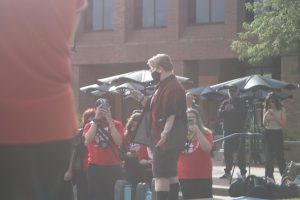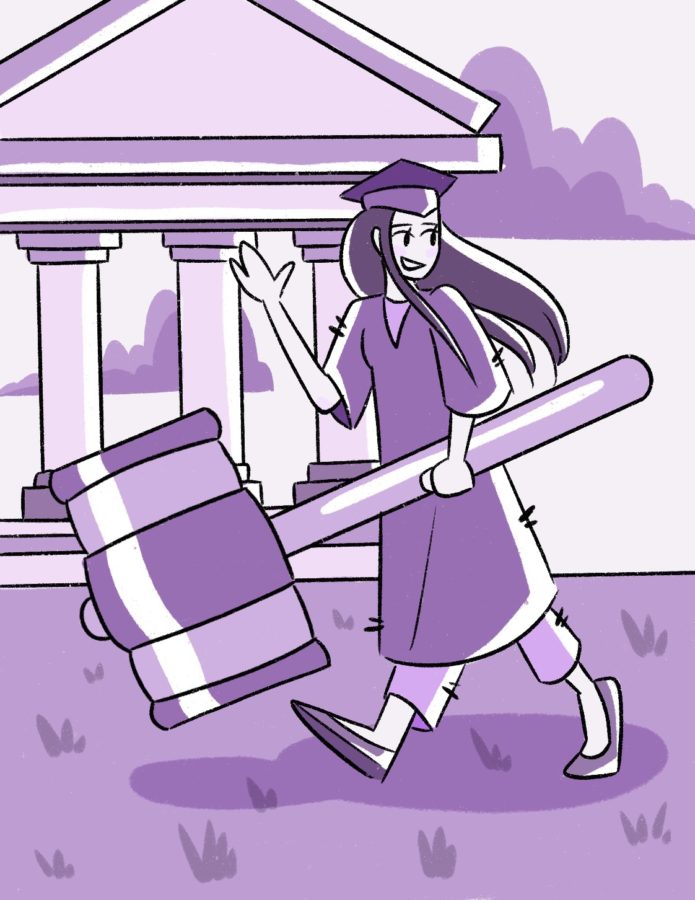Featured photo by Anastasia Lawrence
Ruth Bader Ginsburg is easily one of the most influential social justice seekers of our time. In the wake of 2020, RBG’s death was shocking and stamped another tragic event of the year. Her profound work for women and the oppressed has changed the course of history and left a lasting impression. As a woman, the loss of Ginsburg is unsettling. My fear is that without her, the Supreme Court will reset the social clock as we know it, for fear is the biggest component in what’s driving the political nature of the United States this year. We can only hope that her policies, cases and opinions will be upheld as we make the transition into a new election term. However, as much as I fear the slashing of women and other minority rights, it is important to note just what she did during her life that made her one of the greats.

Ginsburg was “the first woman” in many of the things she did. In law at Harvard, she was one of eight women in her class (history.com). That is quite the accomplishment because there were 500 men in the program. She became the first woman to join the Harvard Law Review, which is a journal where students provide cases as a research tool for authors, researchers and other students. When she graduated from Columbia in 1959, she was first in her class, according to history.com. Imagine the struggle of being a woman today, then put yourself in her shoes. The fact that she rose to the top of a male-dominated field showed her tenacity.
Ginsburg’s biographical movie, “On The Basis of Sex,” gives us a fictional look at the discrimination she faced when trying to find a job as a lawyer. If you haven’t seen the movie, I highly suggest diving into it. It will give you an inside look at the competitive male-dominated law profession, as well as the difficulty in receiving credibility as a woman in society. Instead of going directly into practicing law, she became the first woman tenured professor at Columbia in 1972. Although being a professor is a rewarding job, she was too determined to settle. Being a professor pushed her to make the tables turn for women in this country.
One of the most influential things she did was serve as the director of the Women’s Project for American Civil Liberties Union. The ACLU protects constitutional rights for all people. She argued six of the most controversial cases in civil law history. Going through these cases is tedious and detailed, but here is a quick review of five of the six cases.
Frontiero v. Richardson, 1973
Sharon Frontiero was in the United States Air Force and wanted dependent status for her husband because of her income but was turned down because her husband did not rely on her for more than half of the household income. The decision was 8 for and 1 against that this was discriminatory based on gender in similar situations.
Kahn v. Shevin, 1974
The state of Florida provided compensation of $500 for a widower for property tax exemption. Florida does not allow property tax exemptions for widowers. The argument Ginsburg made was the property tax did not violate the Equal Protection Clause of the 14th Amendment, because women face more difficulty in getting a job than men. The clause remained.
Weinberger v. Wiesenfeld, 1975
Stephen Weinberger and Paula Poltaschek lived off of Paula’s salary as a teacher. She died, so Stephen applied for Social Security benefits. However, the benefits of a woman could only be applied to their children, not the husband. This was the opposite of the case Califano v. Goldfarb in 1976, which Ruth also argued. Both discriminated “on the basis of sex,” and the law was overturned.
Califano v. Goldfarb, 1976
Leon Goldfarb was a widow who applied to receive survivors’ benefits under the Social Security Act. There was a requirement that the woman had to make half the income in the household to receive compensation. It assumed that men carried more weight in the household and deserved more protection. The decision was that this was unconstitutional and violated the Fifth Amendment and subsequently was discriminatory toward women.
Duren v. Missouri, 1978
Billy Duren was being tried for first-degree murder and robbery. The case argued for violation of the Fourth and Sixth Amendments that there weren’t enough women on the jury for a fair trial. The decision was this did violate those amendments, and there was no reason to exclude women from being jurors.
Most of Ginsburg’s endeavors sought equality among men and women, and she succeeded and was an advocate for all. She was appointed by President Jimmy Carter for the U.S. Court of Appeals in 1980. In 1993, President Bill Clinton appointed her to the Supreme Court.
In the most recent years, she worked on United States v. Virginia, which said the military couldn’t refuse women for service. She won the Thurgood Marshall Award in 1996 for her fights for gender equality and civil rights. She voted in favor of the LGBTQ marriage law legality in all 50 states in Obergefell v. Hodges.
It is evident Ginsburg was a pioneer and innovator of modern times. I can only hope as we continue on in society as women that we can be as strong and openly absolute in our protection of women in this country. Filling the shoes of RBG will be an uphill battle, one of which has left us in fear of what will happen during the next presidency. It poses the question to all of us: How strong is our democracy if the death of a leader can instill fear in an entire population?


















